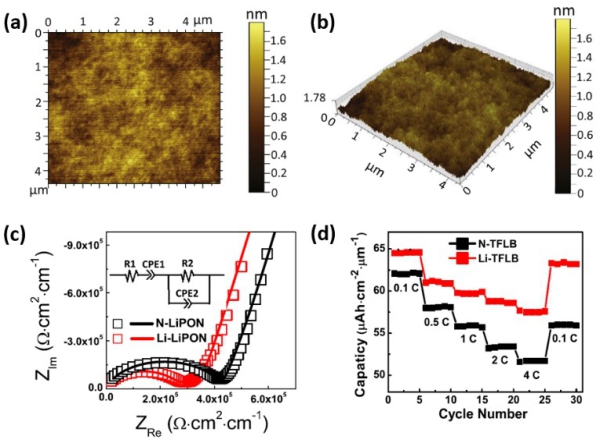Scientists Develop Novel LiPON Solid-State Electrolyte Improves the Li Ionic Conductivity
Date:03-01-2019 | 【Print】 【close】
Recently, Prof. YANG Chunlei, working at the Shenzhen Institute of Advanced Technology, Chinese Academy of Sciences, together with his co-workers fabricated the Li-compensated LiPON (Li-LiPON) thin film solid electrolyte by sputtering a sintered Li-rich Li3.3PO4 target instead of the normally Li3PO4 target, which improves the Li ionic conductivity of solid electrolyte and the rate performance and capacity retention ratio of all-solid-state thin film lithium batteries (TFLB). This research paper titled by “Superconductivity in solid benzene molecular crystal” was published on Solid State Ionics.
All-solid-state TFLB is an important research topic in the field of lithium battery in recent years, which is known as a promising candidate for micro-power applications such as smart cards, radio frequency identification, portable electronic devices, and other micro-electromechanical systems as the on-chip or lab-on-chip power source. A typical TFLB consists of a cathode layer, an electrolyte layer and an anode layer, with the total thickness around tens of micrometers. Especially, the importance of electrolytes to the performance of the battery has been recognized. Numerous solid-state and solid-liquid mixed electrolytes have been examined and studied, and the LiPON solid state electrolyte is a promising candidate.
Prof. YANG Chunlei and his team members ZHONG Guohua, TONG Jun and XIAO Dongli have successfully developed a novel LiPON solid-state electrolyte. This kind of solid electrolyte was fabricated by sputtering a sintered Li-rich Li3.3PO4 target instead of the normally Li3PO4 target. Thus, Li was compensated in this new electrolyte compared with the traditional one, which improves the Li ionic conductivity to 3.2×10?6 S/cm.
The performance of all-solid-state TFLB based on this new electrolyte has much better rate performance and higher capacity retention ratio, because Li-compensated LiPON solid electrolyte helps to reduce the space-charge layer effect induced by Li ionic defects. This result is helpful to further optimize the LiPON electrolyte for better thin film solid state batteries.

Fig1. (a) and (b) are corresponding to 2D and 3D AFM images of Li-LiPON electrolyte thin film, respectively. (c) The electrochemical impedance spectra of electrolyte layers. (d) Cycle dependence on the discharge capacities for TFLBs at selected rates.
